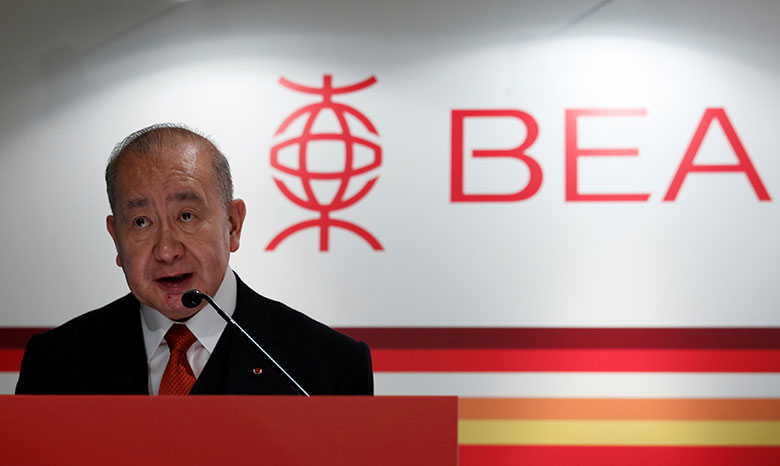David Li, chairman of Bank of East Asia
Bank of East Asia (BEA) and activist shareholder Elliott Management put a long-running legal dispute on hold, announcing a strategic review of the Hong Kong lender’s operations just weeks before the start of a court hearing.
The détente marks a pause in long-standing hostilities between the two. Elliott first called for the bank to put itself up for sale five years ago, with the New York hedge fund linking BEA’s poor share performance to perceived weak management.
However, on Wednesday, the pair issued a joint press release saying Goldman Sachs had been hired to carry out a ‘comprehensive review’ of BEA, to identify ‘strategic transactions’ that would boost its bottom line. A spokesman at Goldman Sachs in Hong Kong declined to comment.
It marks the first time the two sides have properly seen eye to eye.
In the statement, BEA co-CEOs Adrian and Brian Li said the review was “important” to efforts to improve capital efficiency and shareholder value, while Elliott co-chief executive Jonathan Pollock pointed to BEA’s “strong and valuable franchise” in Hong Kong and mainland China.
Sources hailed “trust and dialogue” between the two, and a “willingness to work together to reach an agreement that everyone is happy with”.
Control
Yet BEA’s future remains uncertain. Relatively small in scale, it is the last of its kind in a city once rife with proudly family-run lenders. Hong Kong’s banks are now in the main controlled out of London or Beijing, and the Li family have fought hard against ceding control of an institution founded more than a century ago.
David Li, father to Adrian and Brian, and great-nephew of the founder, remains chairman, having stepped down as CEO last year. He owns 3.44% of the bank, but that share is dwarfed by Elliott, which owns around 8% of BEA, Spain’s CaixaBank, which owns 16%, and Japan’s SMBC, with a 17.5% stake.
For its part, BEA is keen to remain independent and family run. It continues to invest in hard and soft infrastructure, remodelling jaded branches and pouring money into digital. Sources close to the lender said the “focus is not to break up the bank”.
All options [remained open, including] potentially divesting [the bank’s] Hong Kong or China operations or both
– Citi
However, other sources familiar with the matter said that every eventuality was still in play. Were BEA to be put up for sale, analysts said there would be plenty of interest from investors keen to buy its assets and operations in Hong Kong, in the mainland, or in both.
Few commercial lenders have a notable presence in Asia’s largest economy and in the region’s primary financial hub. BEA has 264 branches in total, 166 in Hong Kong and the rest scattered across the mainland, from Shenzhen to Beijing. All eyes now will be on the status update, to be delivered on or before June 30.
The review offers both sides a chance to press pause on the long-running dispute. Elliott has applied for a stay on its unfair prejudice proceedings against the bank and against some former and serving BEA directors.
The hearing was slated to take place in a Hong Kong court from early May. It’s important to note that legal proceedings brought against BEA by Elliott have been paused – but not withdrawn.
Profit
What lies ahead? The review will surely take note of the fact that BEA has, by any measure, chronically underperformed. Profit slumped 50% year-on-year in 2019, to HK$3.26 billion ($420 million), the lowest level since 2009, while its shares have been on a downward trajectory for two and a half years.
In China, supposedly the cornerstone of its future business, losses hit HK$3.55 billion last year, as provisions for bad loans surged. BEA immediately announced plans to reorganize its mainland business, by slashing lending to clients in second-tier cities.
Performance has not been helped by a slowing China economy, the spread of the deadly Covid-19 coronavirus and the riots that last year tore apart Hong Kong.
On Wednesday, Citi published a research note saying that “all options” remained open, including “potentially divesting [the bank’s] Hong Kong or China operations or both”. Citi framed three possible outcomes: a sale of BEA’s China business; separate divestments of its Hong Kong and mainland units; and putting the entire bank up for sale.
Citi said the second option could offer the highest sales multiple, and push BEA’s stock to HK$26.4 a share, from HK$16.68 at close of trading on March 3. That outcome would value Elliott Management’s stake in Hong Kong’s last family run bank at just shy of $800 million, against $500 million at the start of the month.


 Signal2forex.com - Best Forex robots and signals
Signal2forex.com - Best Forex robots and signals




